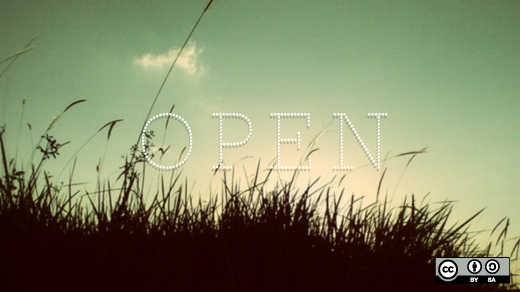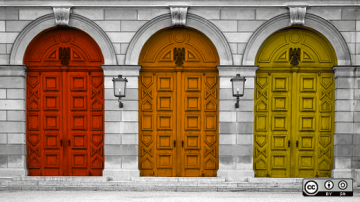Opensource.com readers might feel tempted to shrug off Johan Norberg's recent book, Open: The Story of Human Progress, as just one more sermon preached to a choir of devoted believers. But while the sermon offers some familiar themes, this new work deserves serious new attention.
It's an ambitious manifesto, reaching for global scale, arguing that the future progress of the whole world now depends, existentially, on nations' and societies' embrace of open practices. The call is also particularly timely: 1990s-era optimism about burgeoning openness in Western societies is today ceding to a more pessimistic reality. Recent commentators seem to echo George Will, who said September 11, 2001 marked "the end of our holiday from history."
To which Norberg seems to implicitly answer: "And because of that, more than ever, the world now needs more 'open.'"
In this review, I want to offer only a brief outline for Norberg's argument about the importance of openness today. I don't aim to be comprehensive; instead, I wish to summarize only as much of the book as is necessary for explaining the questions I feel it raises—not only for me, but also, I suspect, for anyone interested in the ongoing, global conversation about "open" principles and practices today.
"The power of open"—throughout history and into the future
Norberg's argument is quietly polemical and unfolds slowly. But the winding road he paves allows him to argue repeatedly that adoption of greater "openness" by various communities or states through time—openness to ideas, innovations, and improvements (whether borrowed, traded, or imported through immigration)—best explains why history's "winners" went on to flourish. Similarly, his case discussions counter-argue that when these winners started to retreat from openness (in different ways), their progress slowed or halted.
The second half of the book ("Closed") draws from a range of landmark sociopsychological research, from which Norberg constructs an explanation of why humans, despite a penchant for learning from the good ideas of others, also backslide into competitive and adversarial tribal loyalty. We are, Norberg illustrates, maddeningly capable of both win-win collaboration with others but also zero-sum warfare and mutual destruction, often with those same "others." This central dilemma of human nature, he suggests, must somehow be resolved to establish more openness all around, even though managing openness is more difficult and often imprecise.
His final chapters offer various suggestions for tilting zero-sum advocates away from destructive and closed tribal thinking. Pushing for greater openness all the time, the author suggests, may have short term costs for those who dare, but will ultimately deliver longer-term progress for them—and indeed human civilization more broadly. If today's civilization fails in this, he repeatedly warns, we have only our collective selves to blame for the grinding decline that awaits.
It's always more complicated
This is a thought-provoking book, but embracing its pitch requires several leaps of faith.
The first part of Norberg's thesis—that the lessons of yesterday's civilizations demonstrate that all human progress has come from the energetic pursuit of "open"—launches on soaring wings over historical landscapes inevitably more complicated than Norberg suggests (Ron McFarland notes this, too, in his review of the book). A host of PhD dissertations could test his flurry of propositions about this pivotal point of world history. Each of his case examples might be (and through the years have been) plausibly interpreted with differing explanations.
To highlight just a few:
- Norberg argues that the floreat of ancient Greece can be linked to its invention of "open" rationality and science, coupled with inter-city state exchange and debate. But the Greek poleis were by no means all democracies or given to such values, and much of their history was defined by destructive (i.e., zero-sum) wars with one another. And even the Greek jewel of openness—5th C. BCE Athens, in the age of Pericles—was also famous for progressively tightening its citizenship during the same era, and imposing multiple barriers against growing immigration. It was less open than contemporary speeches might suggest.
- Turning to Rome, Norberg stresses that the power and success of its empire stemmed from ongoing acquisition (via trade and conquest) and then application of the ideas of other peoples from across its domains. But he glosses over the notion that Rome's public-spirited culture and citizenship of Res Publica developed in opposition to its early enemies.
- Next to Britain: Norberg links the country's 18th-19th C. industrial revolution to adaptation of Dutch financial innovations and the creativity of immigrant Jews and Huguenots, but it also gives short shrift to the formative dynamic of its centuries-long wars with, and efforts to distinguish the nation from, France and its more statist approach to the economy.
- And finally to America, which Norberg argues owes much to its early embrace of immigration, freedom of religion, and intercultural exchange, though he tends to downplay the country's very non-open approach to embedding slavery in its founding.
None of these objections should destroy belief in the value of open innovation for creating progress in a given civilization (or nation, or organization). But we should always remember that events are more complicated than our stories often attest.
An equation with two unknowns
So greater openness leads to greater progress, says Norberg. And yet a statement this simple becomes more complicated when readers reflect on precisely how the author defines both "open" and "progress." Students of algebra know the fundamental conundrum of solving an equation with two unknowns. Norberg's book rests upon a similar conundrum.
Let's unpack it. First, how exactly are we to understand progress?
Norberg might reasonably claim that traditionally-perceived "great" civilizations he explores—e.g., classical Greece (6th-4thth C. BCE), ancient Rome empire (31 BCE-476 AD), China's Song dynasty (960-1279 AD), Britain in the age of Industrial Revolution (18th-19th C.)—are self-evident laudable embodiments of what "progress" is. But in also applauding the open innovation practices of the 13th C. Mongolian king, Genghis Kahn, Norberg seems to imply that we should similarly admire the legacies of a leader known for his armies' terrifying conquests and passion for revenge (but in fairness, also for certain accomplishments in statecraft, Eurasian commerce, and religious tolerance). On the other side of the coin, Norberg paints the Catholic Church as a historical force of progress-destroying hierarchy and closure. But he also ignores its role in unifying much of Western civilization and preserving so much of its cultural legacy for subsequent generations.
We should acknowledge, of course, that all the civilizations Norberg features in Open had both inspiring and repugnant features, and even those judged on balance today as "morally bad" may have contributed certain things, born of cross-boundary innovation, to the "greater good" of later humankind. So in celebrating the contributions of "open," then, how should we define and judge the nature of progress per se? Norberg fails to firmly assert exactly what his "pursuit of open" actually aims for. In the simplest terms, it seems to be whatever (supposedly well-understood) value for the world can be seen in this or that legendary civilization of the past.
And Norberg's treatment of "open" is similarly ambiguous. But at least this concept becomes a little clearer as the book unfolds.
Norberg never offers a concise, summary definition of his book's eponymous concept; instead, he plots plenty of dots that readers must connect into a general outline of what "open" means to him. Overall, by my own reading of his story, "open" signifies communities, organizations, or societies that are:
- inviting of new ideas from others, gathered or created as a result of trade, exchange, cross-boundary collaboration or arrival and integration of newcomers, and
- sustained by tolerance of diversity and dissent, inclusiveness, free-flowing debate, large (or at least selected) degrees of individual liberty, and avoidance (if not prohibition against) tribal enmity and destructive rivalry based on group identities or fear-inducing hierarchies of power
For Norberg, an all-important concept captured in a single word sits atop a host of interconnected conditions and attributes.
What gets in the way
Norberg's acute insights into individual and group behaviors make the second part of the book more distinctive than the first.
The author outlines the dilemma of human collaboration, the successes of which can so quickly turn into suspicions of others, and the failures of which can create fear and enmity. He demonstrates how our competitiveness and zeal for affiliation encourages us to continuously divide the world into "us" and "them," even when "they" have good ideas that we freely borrow and benefit from. Norberg similarly explains how our laudable desire to win too often forces us to push for zero-sum victory, when objective assessment regularly shows that win-win partnerships with would-be opponents deliver more value for all.
In another illuminating section, the author explains why humans tend to falsely romanticize bygone days—because we conveniently minimize past problems and exaggerate new looming challenges, thus steering us away from future opportunities and new sources of potential innovation. Comparable research also shows that, in times of threat or instability, a powerful part of our brain starts to crave the security of control—and then we trade personal liberty and respect for others for the controlling and often abusive protection of powerful hierarchical leaders.
All such impulses make us less trusting of—and less willing to invest or take risks in—"open."
Closing time
Regrettably, Norberg's shrewd analysis of why humans so easily abandon opening up doesn't culminate with many concrete suggestions for restraining or converting our closed-leaning impulses and behaviors.
The ideas and principles he advances are all reasonable (some research-based, others reflective of the author's personal experiences), but they only hint at any kind of scalable institutional transformation. Here are some highlights:
- Norberg vaguely asserts that societies or other entities aspiring to enduring openness must build cross-cutting identities to break down tribal enmities; encourage their member's empathy for "others" of "out-groups" by constructive use of literature, art and mass communications; and expand trade to build ideas of "mutual usefulness" among nations, instead of war (which motivated formation of the European Union after World War II).
- Norberg similarly attacks the costs of "zero-sum" economics and the thinking underpinning it, describing how and why (over time) zero-sum policies have created more closed societies. But here again, he offers little concrete suggestions for scalable prevention.
- Norberg critiques the (misguided, in his view) embrace of nostalgia for bygone better times (which were really not better, as he shows), calling instead for new systems that increase people's awareness of future threats (e.g., global warming) and provide incentives for populations to volunteer their best ideas for how to deal with them.
So in the end, while Norberg's historically informed vision for a more open future is bold, his practical suggestions for bringing about that future and translating it to today's world are decidedly less so. Open makes lively reading and is rich with insights about the human foibles and behaviors that so often hinder human progress, even if it disappoints when it leaves so much unexplored. Anyone working through its pages will be forced to think more deeply about what is surely a major—even if not the only—explanation for the progress and success of nations and civilizations.
And it will also push every reader to ponder what can be done today, to promote more openness towards such desirable ends. In the second part of this review, I will explore some of the future-facing questions it raised for me.







Comments are closed.